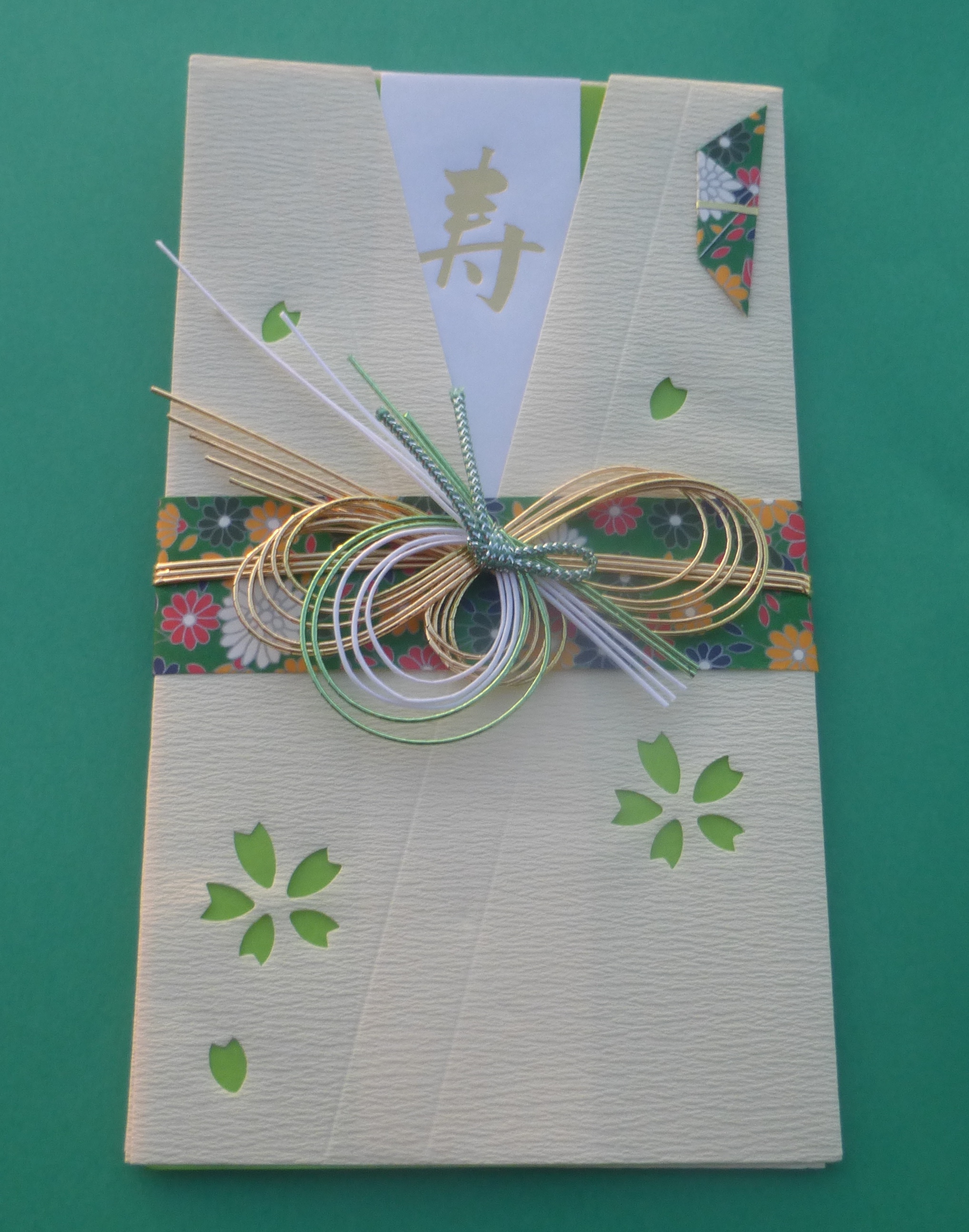Shūgi-bukuro on:
[Wikipedia]
[Google]
[Amazon]
 A is a special envelope in which
A is a special envelope in which
 A is a special envelope in which
A is a special envelope in which money
Money is any item or verifiable record that is generally accepted as payment for goods and services and repayment of debts, such as taxes, in a particular country or socio-economic context. The primary functions which distinguish money are as ...
is given as a gift of celebration in Japan, especially at weddings
A wedding is a ceremony where two people are united in marriage. Wedding traditions and customs vary greatly between cultures, ethnic groups, religions, countries, and social classes. Most wedding ceremonies involve an exchange of marria ...
or other auspicious occasions, such as a birth or celebrating a new home. The giver inserts the money into a on which they have written their name, and the amount of money inside. In the case of weddings, the is handed to the receptionist of the reception party; otherwise, the money is collected by the person themselves, with the envelopes acting as a record of who gave money and how much they gave. are sold at supermarkets and stationery stores.
are a category of , the general term for an envelope of money given on a special occasion. They are distinct from the category of envelopes of money given for funerals, known as or . were traditionally hand-made by the person giving the money, a practice that has now largely fallen out of fashion. The envelopes are typically decorated with cord, with the colour of the cord having significance for the occasion, or, in the case of a funeral, the religious denomination of the giver.
Amount given
The amount given in differs according to the givers' relationship to the couple, their social status and the style of venue. In the case of friends or company colleagues, the amount given is usually between ¥20,000 and ¥30,000. In the case of close friends or those in a senior position at the bride or bridegroom's company, ¥30,000 to ¥50,000 is common, and in the case of relatives, ¥50,000 to ¥100,000 is not unusual. For married couples that attend the wedding, ¥50,000 would be common, as opposed to unmarried couples, where each person would give a separate amount of roughly ¥30,000 each. It is common to give amounts in which the leading digits form anodd
Odd means unpaired, occasional, strange or unusual, or a person who is viewed as eccentric.
Odd may also refer to:
Acronym
* ODD (Text Encoding Initiative) ("One Document Does it all"), an abstracted literate-programming format for describing X ...
number, such as ¥10,000 or ¥30,000, in order to symbolize the fact that the newly married couple cannot be divided. When the leading digit forms an even number, as in ¥20,000, the amount is usually given in an odd number of bills (e.g. 1 × ¥10,000 and 2 × ¥5,000). Amounts in which the leading digit forms a multiple of 4, such as ¥40,000, are not typically used, as the number 4 in Japanese
Japanese may refer to:
* Something from or related to Japan, an island country in East Asia
* Japanese language, spoken mainly in Japan
* Japanese people, the ethnic group that identifies with Japan through ancestry or culture
** Japanese diaspor ...
can be pronounced as , the same as the pronunciation of the Japanese word for "death
Death is the irreversible cessation of all biological functions that sustain an organism. For organisms with a brain, death can also be defined as the irreversible cessation of functioning of the whole brain, including brainstem, and brain ...
". Likewise, multiples of 9 are avoided, as the pronunciation of this number - - is identical to the word for "suffering".
See also
*Washi
is traditional Japanese paper. The term is used to describe paper that uses local fiber, processed by hand and made in the traditional manner. ''Washi'' is made using fibers from the inner bark of the gampi tree, the mitsumata shrub (''E ...
, Japanese paper, used to make
* , decorative cords wrapped around
* , a traditional Japanese New Year's gift
* , envelope for condolence money offered at Japanese funerals
* Red envelope
In East and Southeast Asian cultures, a red envelope, red packet or red pocket () is a monetary gift given during holidays or for special occasions such as a wedding, a graduation, or the birth of a baby. Although the red envelope was populari ...
, or , the Chinese equivalent.
* Origami
) is the Japanese art of paper folding. In modern usage, the word "origami" is often used as an inclusive term for all folding practices, regardless of their culture of origin. The goal is to transform a flat square sheet of paper into a f ...
* Origata
* Noshi
are a kind of ceremonial origami fold entirely distinct from "origami-tsuki". They serve as gifts that express "good wishes". Noshi consists of white paper folded with a strip of dried abalone
Abalone ( or ; via Spanish , from Rumsen '' ...
Notes
References
{{DEFAULTSORT:Shugi-Bukuro Marriage and religion Wedding gifts Giving Japanese culture Marriage, unions and partnerships in Japan